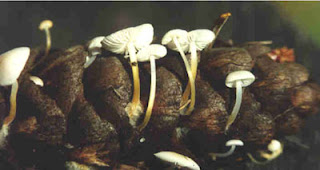
Saprophytes are the organisms that act as the rainforests decomposers, competing with the heavy rainfall which constantly washes away nutrients on the forest floors. Some fungi, called mycorrhizals, are examples of plant life that carry out this function. Decomposers work extremely efficiently and, together with the warmth and wetness which helps accelerate decomposition, can often break down dead animals and vegetation within 24 hours. Decomposition in montane forests, which are colder and less humid, however, can sometimes take up to six weeks. Many saprotrophs are so small, called microbes, that they cannot be seen with the naked eye. Other decomposers, which include insects, grubs, snails, slugs, beetles and ants, aid in recycling valuable nutrients from dead organic matter which is then released back into the soil to be reabsorbed rapidly by plants and trees. Decayed matter contains essential nutrients like iron, calcium, potassium and phosphorous all of which are necessary to pro...
























